Health and Sport Committee
Annual Report of the Health and Sport Committee for 2020-21
Introduction
This annual report covers the period of 12 May 2020 to 24 March 2021, after which the Scottish Parliament will go into the campaign recess period from 25 March to 4 May 2021. The Scottish Parliament agreed on 3 March 2021 to vary Standing Orders so that committees could not meet during the pre-election campaign period (with the exception of the COVID-19 Committee, which may be convened in an emergency). This decision was taken in response to the Scottish General Election (Coronavirus) Act 2021 which provides that the Scottish Parliament will not be dissolved until 5 May 2021 to permit the Parliament to meet to legislate for a new polling date if required.
The remit of the Committee is to consider and report on matters falling under the responsibilities of the Cabinet Secretary for Health and Sport, Jeane Freeman MSP, the Minister for Mental Health, Claire Haughey MSP and the Minister for Public Health and Sport, Mairi Gougeon MSP.
As per the Strategic Plan and Vision 2016-21, our overriding aim is to improve the health of the people of Scotland.
Membership Changes
There was one change in Committee membership during the reporting year -
Miles Briggs left the Committee on 20 August 2020 and was replaced by Donald Cameron who rejoined the Committee.
What should primary care look like for the next generation?
Phase One of this inquiry focused on gathering views and experiences from the public at a number of public meetings and via an online survey. Phase One concluded with the publication of our report "What should primary care look like for the next generation?" on 3 July 2019.
Phase two of the inquiry began in July 2019 with a call for views and evidence sessions. We took evidence from a range of stakeholders as well as the Cabinet Secretary for Health and Sport. Our final evidence session on 19 November 2019 was a round table with a selection of attendees who were involved in the public panels in Phase One to discuss the evidence presented to us in Phase Two.
Due to the impact of COVID19 we put publication of our Phase Two report on hold. This enabled us to incorporate evidence gathered as part of our COVID-19 scrutiny. Phase two concluded with the publication of our report "What should Primary Care look like for the next generation? Phase II" on 16 February 2021. The report was debated by the Parliament on 3 March 2021.
The supply and demand for medicines
This inquiry was linked closely with the previous two inquiries 'What should primary care look like for the next generation?' and 'Social prescribing of physical activity and sport'. The focus of the inquiry was to look at the management of the medicines budget, including the clinical and cost effectiveness of prescribing.
In early 2020 we took evidence on four distinct, but related, parts covering the supply and demand for medicines in Scotland—
Purchasing (including procurement and medicine price regulation, a reserved area undertaken at a UK level);
Prescribing (covering all qualified to write prescriptions);
Dispensing (covering hospital, pharmacy and GP); and
Consumption (looking at effectiveness and wastage).
Our report, Supply and Demand for Medicines, was published on 30 June 2020. We received a response to the report on 11 September 2020 from the Cabinet Secretary for Health and Sport. Following consideration of this response we wrote to the Cabinet Secretary on 1 October 2020, seeking a response which addresses each recommendation within the report, as per existing protocol. We received a response to the recommendations in the report on 23 November 2020.
Social Care
For this inquiry, we wanted to explore the future delivery of social care in Scotland and what is required to meet future needs. We issued an initial call for views which ran from 19 December 2019 to 20 February 2020. We received 226 responses.
Following this initial evidence gathering our inquiry was impacted by the COVID-19 pandemic. From May to September we gathered additional evidence to hear about the impact of the pandemic on social care and support:
4 June 2020 - evidence session with the Cabinet Secretary for Health and Sport on the issue of COVID-19 on care homes
COVID-19 care home inquiry responses from care home managers
COVID-19 care home inquiry responses from public, staff and relatives
How has COVID-19 impacted on care and support at home in Scotland? Survey results
In September 2020 we agreed the outcomes of our inquiry should add value to the Scottish Government's independent review of adult social care, announced on 1 September 2020. We agreed to continue to scrutinise what the future of social care and support should look like and include lessons learned from the pandemic.
We wanted to discuss potential positive actions and explore possibilities of how social care and support can be reimagined. We took oral evidence in three round-table sessions during October and November 2020 as follows:
6 October 2020 - three social care experts from academia, third sector and health and social care partnerships
17 November 2020 - six individuals in receipt of care or support or with caring responsibilities
24 November 2020 - three social care professionals involved in the delivery or commissioning of services
Our report, The Future of Adult Social Care and Support in Scotland, was published on 10 February 2021.
Following this we held one further round table session on 23 February 2021 to hear views on the outcome of both our report and the Scottish Government's Independent Review of Adult Social Care. We wrote to the Cabinet Secretary for Health and Sport on 26 February 2021 to highlight the issues raised with us during this session.
COVID-19
In May and June 2020 we held the following evidence sessions on COVID-19:
Date Evidence Session 7 May 2020 Personal Protective Equipment (PPE) 27 May 2020 Testing 4 June 2020 Care Homes 17 June 2020 Resilience and Emergency Planning Source: The Scottish Parliament
To help inform our sessions on testing and care homes, we ran surveys during May 2020 online via Citizen Space.
On 3 November 2020 we agreed to undertake a short, focused inquiry into the impact of COVID-19 on sports clubs, leisure venues and communities. We agreed our inquiry would have a particular focus on any reductions or cessation of community-based activities undertaken by sporting organisations including mental and physical health impacts on individuals.
We ran two online surveys to hear about the impact on community sports clubs and sporting venues and the effects on users. The first of our surveys opened on 16 November 2020 and we heard from sporting organisations, sports clubs and venues to inform the committee about the impact COVID-19 has had on the ability to provide community based activities and initiatives; the financial impact; and the potential long term impact. The second of our surveys opened on 23 November 2020 and heard from individuals on the impact COVID-19 has had on access to sport. Each survey closed on 7 December 2020.
Following the survey responses we took evidence as follows:
15 December 2020 - Scottish Government and supporting officials
12 January 2021 - Individuals and sporting organisations
To help inform our meeting on 15 December 2020, we wrote to the Scottish Government on 12 November 2020. We received a response on 25 November 2020.
Following our evidence session on 15 December 2020, we wrote to the Scottish Government on 22 December 2020 to seek further information on a number of issues. We received a response on 18 January 2021.
We wrote to the Minister for Public Health and Sport on 17 February 2021 to highlight the key themes and issues from our session on 12 January 2021 and to recommend the Scottish Government makes provisions for a long-term national strategy to increase the physical and mental health of the nation. We received a response on 8 March 2021.
Scrutiny of NHS Boards
In addition to our distinct inquiries, we continued our oral evidence sessions with territorial health boards and special boards to scrutinise performance and outcomes delivered. The evidence sessions held in this reporting year were—
Date of Meeting Health Board 29 September 2020 NHS 24 15 December 2020 NHS Borders 19 January 2021 NHS Highland 2 February 2021 Scottish Ambulance Service Source: The Scottish Parliament
As with our budget scrutiny approach, the scrutiny of NHS Boards is continuous throughout the year.
For the first time this parliamentary session, we held an oral evidence session with the Scottish Trauma Network on 26 January 2021. We received updates on the performance, objectives and benefits produced from the Major Trauma Centres (MTCs) up and running in the North and East Regions as well as the time scales for the West and South East becoming operational.
Pre-Budget Scrutiny 2021-22
As agreed at the start of the Parliamentary session, we adopted a full year budgeting approach, building an element of budget scrutiny into all aspects of our work. We scrutinise the spending of approximately 50% of the Scottish Budget. We agreed to undertake pre-budget scrutiny of the 2021-22 budget while considering the impact of COVID-19 on the Health and Social Care 20/21 settlement.
We held pre-budget evidence sessions as follows to help inform our scrutiny—
Date of Meeting Attendees 11 August 2020 NHS Scotland
Department of Health and Social Care
25 August 2020 The Care Inspectorate
1 September 2020 NHS Ayrshire and Arran
8 September 2020 Edinburgh Health and Social Care Partnership
Dundee Health and Social Care Partnership
East Ayrshire Health and Social Care Partnership
15 September 2020 NHS Greater Glasgow and Clyde
NHS Lothian
22 September 2020 Minister for Public Health, Sport and Wellbeing
29 September 2020 Cabinet Secretary for Health and Sport
Source: The Scottish Parliament
We published our pre-budget report 'More than 50% of the Scottish Budget - What are the expected outcomes from the Health and Social Care 2021/22 Budget?' on 10 November 2020. We received a response from the Cabinet Secretary on 8 February 2021.
The Cabinet Secretary and supporting officials attended post-budget evidence sessions on 9 February 2021 and 16 February 2021.
Bills
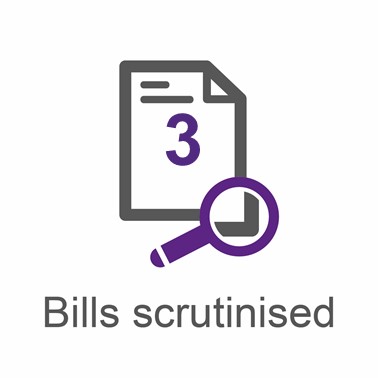
Forensic Medical Services (Victims of Sexual Offences) (Scotland) Bill
The Forensic Medical Services (Victims of Sexual Offences) (Scotland) Bill ("the Bill") was introduced by the Cabinet Secretary for Health and Sport, Jeane Freeman MSP, on 26 November 2019.
The Bill seeks to make health boards responsible for providing forensic medical services to victims of sexual offences (and victims of harmful sexual behaviour by children). These services are currently provided by health boards under a Memorandum of Understanding (MoU)between Police Scotland and NHS Scotland. The Bill seeks to make this a specific statutory duty.
The Bill seeks to make forensic medical examination available on a self-referral basis for people over the age of 16. Self-referral would mean that victims of sexual abuse and rape would be able to access a forensic medical examination without first reporting the incident to the police.
Following the introduction of the Bill, we issued a call for views which ran from 6 December 2019 to 2 February 2020. We received 38 responses.
To inform our stage 1 scrutiny of the Bill we held the following evidence sessions—
Date of Meeting Attendees 10 March 2020 We held an informal meeting with the survivors of assaults to understand their views on the proposals in the Bill. 17 March 2020 Scottish Government Bill Team; and
a round table with representatives from victim support groups
Source: The Scottish Parliament
Due to the COVID-19 pandemic, our remaining evidence sessions were postponed and the deadline for completion subsequently extended..
In May 2020 we resumed our stage 1 scrutiny of the Bill and held the following evidence sessions—
Date of Meeting Attendees 12 May 2020 NHS Lanarkshire
20 May 2020 Children 1st
9 June 2020 The Law Society of Scotland
Police Scotland
23 June 2020 Cabinet Secretary for Health and Sport and supporting officials
Source: The Scottish Parliament
We published our Stage 1 Report on the Bill on 7 September 2020. The Cabinet Secretary for Health and Sport responded on 25 September 2020. The Stage 1 Debate took place in the Chamber on 1 October 2020.
Ahead of our stage 2 proceedings we received letters from the Cabinet Secretary for Health and Sport on 2 November 2020 and 9 November 2020. The second letter included an advance copy of the Children and Young People's Clinical Pathway.
We carried out stage 2 proceedings on Tuesday 10 November 2020.
Liability for NHS Charges (Treatment of Industrial Disease) (Scotland) Bill
The Liability for NHS Charges (Treatment of Industrial Disease) (Scotland) Bill ("the Bill") was introduced in the Scottish Parliament on the 9 March 2020 by Stuart McMillan MSP. The Bill was referred to the Health and Sport Committee on 18 March 2020.
The Bill seeks to amend the Health and Social Care (Community Health and Standards) Act 2003 to include industrial diseases within its scope.
Following the introduction of the Bill, we ran a call for views from 12 August 2020 to 30 September 2020. We received 16 responses.
To inform our stage 1 scrutiny of the Bill we held the following evidence sessions—
Date of Meeting Attendees 3 November 2020 Occupational and Environmental Health Research Group, University of Stirling
Association of Personal Injury Lawyers Scotland
Thompsons Solicitors Scotland
10 November 2020 Minister for Public Health, Sport and Wellbeing and supporting officials
Stuart McMillan MSP, Member in charge
Source: The Scottish Parliament
Following our evidence session on 10 November 2020 the Scottish Government wrote to us regarding the position of the Department of Work and Pensions Cost Recovery Unit on the Bill.
We published our stage 1 report on the Bill on 18 December 2020.
On 22 December 2020 the Bill was withdrawn by the Member in charge, Stuart McMillan MSP.
University of St Andrews (Degrees in Medicine and Dentistry) Bill
The University of St. Andrews (Degrees in Medicine and Dentistry) Bill ("the Bill") was introduced in the Scottish Parliament on 29 September 2020. The Bill was referred to the Health and Sport Committee for Stage 1 Scrutiny.
The Bill seeks to amend the Universities (Scotland) Act 1966 to remove the prohibition which stops the University of St. Andrews from awarding degrees in Medicine and Dentistry. The reason for taking action at this time is to allow the University of St. Andrews, jointly with the University of Dundee, to award undergraduate Primary UK Medical Qualifications to Scottish Graduate Entry Medicine (ScotGEM) students. The first set of students are due to complete their four year course and graduate in 2022.
Following the introduction of the Bill, we ran a call for views from 7 October 2020 to 18 November 2020. We received 11 responses.
To inform our stage 1 scrutiny of the Bill we held the following evidence sessions—
Date of Meeting Attendees 1 December 2020 University of St. Andrews
University of Dundee
British Medical Association Scottish Medical Students Committee
ScotGEM Student Cohort
8 December 2020 Cabinet Secretary for Health and Sport and supporting officials
Source: The Scottish Parliament
We published our Stage 1 Report on the Bill on 20 January 2021. We received a response from the Cabinet Secretary for Health and Sport on 21 January 2021.
We carried out stage 2 proceedings on Tuesday 23 February 2021.
Legislative Consent Memorandums
We considered one legislative consent memorandum this reporting year relating to the Medicines and Medical Devices Bill.
Medicines and Medical Devices Bill
The UK Government introduced the Medicines and Medical Devices Bill in the House of Commons on 13 February 2020. As introduced, the Bill did not relate to matters within the legislative competence of the Scottish Parliament. Following the UK Government amendment to insert Clause 16 (information systems), legislative consent was required on the basis that the information systems established under the Clause could be used for purposes relating to both reserved and devolved matters.
The Scottish Government lodged a Legislative Consent Memorandum (LCM) on 18 August 2020, and subsequent supplementary LCM on 19 October 2020, in respect of the UK Government Medicines and Medical Devices Bills, as amended. These were referred to us for consideration.
We considered both at our meeting on Tuesday 27 October 2020 and reported to Parliament on 29 October 2020 in support of the use of the LCM procedure in relation to the Medicines and Medical Devices Bill.
UK Common Frameworks
The UK and devolved governments agreed that common frameworks would be needed after the UK’s exit from the EU to ensure that, in certain policy areas, there was no divergence between the nations of the UK where that would be undesirable.
During its membership of the EU, the UK and all its governments had been required to comply with EU law. This ensured that in many policy areas, including some that are devolved, a broadly consistent approach was developed across all four nations.
Following its exit from the EU on 31 January 2020, the UK entered a transition period which ended on 31 December 2020. Throughout the transition period all parts of the UK had to comply with EU law. Now the transition period has ended it opens the possibility of policy divergence between the four nations of the UK.
Common frameworks are being developed to ensure that rules and regulations in certain policy areas remain consistent across the UK. Our role is to scrutinise those common frameworks that fall within our remit.
In this reporting year we considered two Provisional UK Common Frameworks—
Provisional UK Common Framework on Nutrition Labelling, Composition and Standards
Provisional UK Common Framework on Food and Feed Safety and Hygiene
Provisional UK Common Framework on Nutrition Labelling, Composition and Standards
The provisional UK Common Framework on Nutrition labelling, Composition and Standards covers:
nutrition and health claims made on foods;
the addition of vitamins, minerals, and certain other substances to foods;
the composition and labelling of food supplements;
the composition and labelling of food intended for infants and young children, food special medical purposes, and total diet replacement for weight control (“Foods for Specific Groups”); and the
mandatory nutrition declaration (food labelling), including additional forms of expression and presentation.
We received a letter from the Scottish Government on 22 October 2020 sharing the provisional UK Common Framework on Nutrition labelling, Composition and Standards. The letter requested we provide our commentary on the provisional Framework.
We agreed at our meeting on the 17 November 2020 to issue a letter to the Scottish Government requesting more information on the Regime being introduced and Governance and Enforcement. We received a response on 30 November 2020.
To inform our consideration of the provisional Framework we held the following evidence sessions—
Date of Meeting Attendees 1 December 2020 Food and Drink Federation Scotland
Nourish Scotland
The Rowett Institute of Nutrition and Health, University of Aberdeen
The Society of Chief Officers of Environmental Health in Scotland
8 December 2020 Minister for Public Health, Sport and Wellbeing and supporting officials
Source: The Scottish Parliament
Following the evidence session with the Minister we issued a letter with our commentary on the provisional framework to the Scottish Government on 22 December 2020. We received a response on 14 January 2021.
Provisional UK Common Framework on Food and Feed Safety and Hygiene (FFSH)
The primary focus of the FFSH Framework is to set out how the four UK countries will work together to develop UK FFSH policy in areas previously harmonised at EU level. The FFSH Framework will apply to retained EU food and feed safety and hygiene legislation. It has been agreed that the following areas should be in-scope of the FFSH Framework:
General Food and Feed Law and Hygiene;
Food and Feed Safety Standards;
Official Controls for Food and Feed; and
Public Health Controls on Imported Food and Feed.
We received a letter from the Scottish Government on 30 November 2020 sharing the provisional UK Common Framework on Food and Feed Safety and Hygiene. The letter requested we provide our commentary on the provisional Framework.
To inform our consideration of the provisional Framework we ran a call for views seeking written views. The call for views closed on 12 January 2021.
To further inform our consideration of the provisional Framework we held the following evidence sessions—
Date of Meeting Attendees 19 January 2021 The Rowett Institute of Nutrition and Health, University of Aberdeen (representing SEFARI - Scottish Environment, Food and Agriculture Research Institutes)
Food and Drink Federation Scotland
26 January 2021 Minister for Public Health and Sport and supporting officials
Food Standards Scotland
Source: The Scottish Parliament
Following the evidence session with the Minister we issued a letter with our commentary on the provisional framework to the Scottish Government on 16 February 2021. We received a response on 5 March 2021.
Subordinate Legislation
During the course of the reporting year, we considered—
7 SSIs subject to the affirmative procedure; and
20 SSIs and SIs subject to the negative procedure.
Three SSIs considered under the negative procedure related to the UK's withdrawal from the European Union.
We also considered 41 SSIs under the made affirmative procedure related to Coronavirus international travel and accommodation regulations.
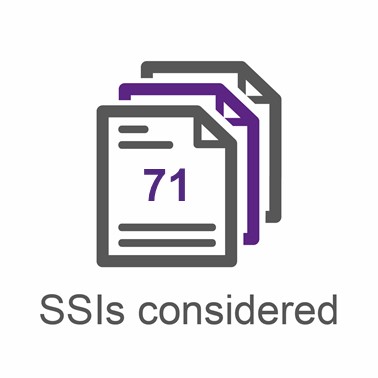 The Scottish Parliament
The Scottish Parliament
UK Statutory Instruments - European Union (Withdrawal) Act 2018
We continued with our consideration of health related statutory instruments, as well as those relating to food standards, from the Scottish Government ahead of the UK's withdrawal from the European Union. The notifications requested the approval of the Scottish Parliament for the exercise of powers by UK Ministers under the European Union (Withdrawal) Act 2018.
In this reporting year we considered 11 notifications in total.
Petitions
We considered three petitions referred to us during the course of this reporting year. All three petitions were closed—
Source: The Scottish Parliament
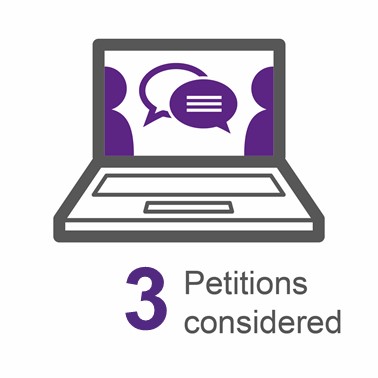 The Scottish Parliament
The Scottish Parliament
Equalities, Engagement and Innovation
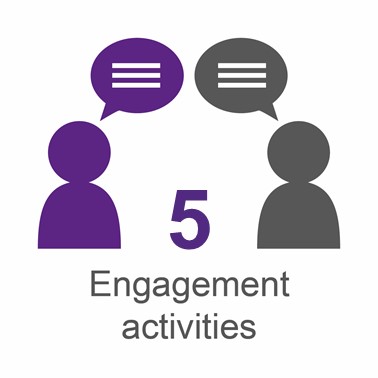
It is important to us that we try to be as inclusive as possible in every piece of work we do. We use a variety of methods to gather information including online surveys and informal evidence sessions. This helps us hear from a wide variety of stakeholders.
Despite the pandemic preventing us from carrying out face to face engagement in this reporting year, we continued to involve people in our work remotely. This included running online surveys through Citizen Space for our Social Care and COVID-19 inquiries. We received 3715 survey responses in total this reporting year.
We also held 3 virtual round table sessions and 2 informal discussions with individuals from across Scotland to help inform our Social Care inquiry and final report. This meant we were able to hear from a wide range of people with shared experience and without geographical limitations.
Twitter has become our core medium for keeping interested groups and individuals informed and we currently have 3600 followers .
We work closely with our Participation and Communities Team to look at new ways to involve the people of Scotland in our work.
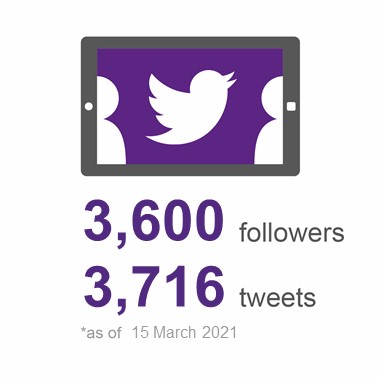 The Scottish Parliament
The Scottish Parliament
Meetings
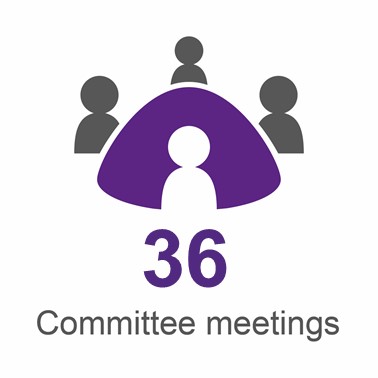
We held 36 meetings in this reporting year. Agenda items held in private were primarily to consider draft reports, approach papers and our work programme. Two meetings were held entirely in private.
Due to the COVID-19 pandemic, our meetings were held virtually throughout the whole of this reporting year.
This year, of 216 witness appearances before the Committee 56% were male and 44% were female.
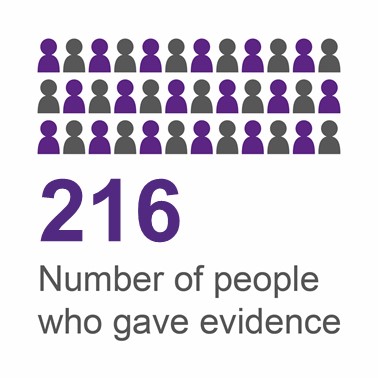 The Scottish Parliament
The Scottish Parliament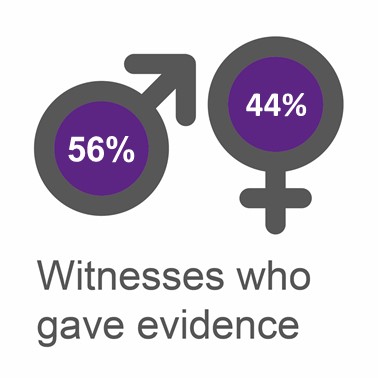 The Scottish Parliament
The Scottish Parliament